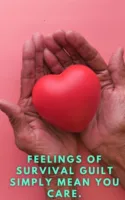When I was in high school, I went through a phase where I hid food or did not eat for a long period of time to see how long I could push myself. It took me most of my adulthood to realise that this was something I needed to have checked out and dealt with. I like to believe that I somehow overgrew this habit, but my relationship with food seems to contradict that. I was reading about survivor’s guilt recently—a term that describes the feelings that arise when a person believes they have succeeded or escaped a difficult situation while others remain trapped in it or are still struggling. I went through that a lot growing up, and I wondered, as I read about this, if my disordered eating habits had anything to do with these feelings.
I must admit, part of me is hesitant about sharing this with my family or anyone. It’s like a two-sided coin. On one hand, it could help us all understand these experiences and deal with them together. But on the other hand, it’s embarrassing to talk about survivor’s guilt when I still feel like I’m struggling to survive myself. How much surviving can I say I have done when everything I do seems like a trauma response from growing up poor?
As I explored this further, I learned that it’s normal to experience a mix of emotions when you manage to move beyond difficult circumstances while others don’t. It can make you question why you deserve success when others are still suffering. I realised that my disordered eating became a way of coping with those feelings, as unhealthy as it was. I had experienced going to bed hungry in my childhood, something my brothers still dealt with, and it affected me deeply. It was a manifestation of my guilt.
I look at people who grew up poor and how they frame their experiences as something that made them who they are. There is a kind of problematic culture where people romanticise poverty to show that they deserve all the success they have because they come from humble beginnings and worked hard to make something of themselves. I am nowhere close to where I see myself going, but nothing about my upbringing defines me. Being poor is something that crippled me growing up, and made me feel powerless and dejected for the longest time. When I was given the opportunity to leave that space for a short time, I took it with both hands, grabbed it tightly, and made sure that I never returned to it.
I agree that growing up poor can have a huge and defying impact on a person’s life and shape their views of the world and their experiences, but I despise how most people feel like we need to carry these experiences for all our lives. I carry them simply because no matter how hard I try to get away from them, I have always remembered that I left people behind, and that makes me feel ashamed because I have it ingrained in me that because I left that life I should be working towards helping my family escape it, too. However, this shame only morphed into a fear of judgment that I am not doing enough to ensure that in this lifetime.
In my reading up more on survivor’s guilt in all its manifestations as I worked through my feelings and wrote this article, there was an essay I found that sought to bring this concept to a more African perspective. It posited that these feelings are rooted in Ubuntu, the concept of humanity. You would not feel survivor’s guilt for people you didn’t know – you only experience it for people within your own particular community. So, if anything, survivor’s guilt is an instance of good character, an emotional expression of a person being bound up with, and committed to, others in their community.
Understanding that survivor’s guilt is rooted in having the heart and kindness to empathise with other people’s circumstances, recognising that you are also not responsible for what happens to them, and putting yourself in a position to give back are the few things we can do as people to make sense of these feelings, and live with what comes from the emotional work of dealing with them.
Tell us: what do you think about ‘survivors’ guilt’?
Read about an eating disorder here.



